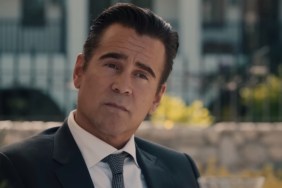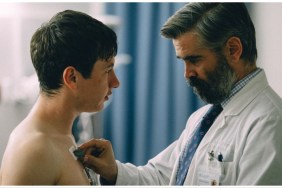
9 out of 10
Cast:
Colin Farrell as Steven Murphy
Nicole Kidman as Anna Murphy
Barry Keoghan as Martin
Raffey Cassidy as Kim Murphy
Sunny Suljic as Bob Murphy
Alicia Silverstone as Martin’s Mother
Bill Camp as Matthew
Megan Chelf Fisher as Diner Patron
Anita Farmer Bergman as Nurse
Lea Hutton Beasmore as Conference Guest
Rachael Mcadams as Conference Attendance / Nurse
Josephine Elle as Doctor
Nathaniel Sizemore as Hospital Orderly
Matt Ridley as Hospital Security
Amy Clark as Conference Guest
William Willet as Open Heart Patient on Table
Directed by Yorgos Lanthimos
The Killing of a Sacred Deer Review:
To Yorgos Lanthimos, most conversations are rooted in lies. Whether it’s in relationships, like The Lobster, or the interfamily relationships of The Killing of a Sacred Deer, the spoken word is only a thin veneer between what is polite, and what is true. We are trapped in loops of behavior, and only moments of great tragedy cause us to break free. Lanthimos seems most interested in the meanings behind things, behind repressed behavior, or social niceties and mores, even how we profess our feelings towards each other. The Lobster covered similar thematic territory, but it does it in fun. The Killing of a Sacred Deer is far more serious. This film examines the silence between sentences, and it has a moral clarity to it that for some may be a brutal truth. The world of The Killing of a Sacred Deer may be cruel and wounding, but it is fair, and that sense of hateful justice is terrifying.
Steven Murphy (Colin Farrell) is a cardiologist, who several months before lost a patient on the operating table. He continues a strange relationship with the patient’s son Martin (Barry Keoghan), partly to assuage his guilt, and partly because he is possibly seeking a kind of kinship with him. His wife Anna (Nicole Kidman) is also a doctor, an ophthalmologist, and Steven and Anna have two children, Kim (Raffey Cassidy), and Bob (Sunny Suljic). Steven and Anna seem to go about the motions of parenthood, but there is a disconnect that is impossible to deny. And while Steven puts on a front of responsibility, inside he is a coward wracked with guilt, unable to go beyond the platitudes and banalities of everyday life. And as Martin grows closer to the family, tragedy strikes the children, a medical anomaly that cannot be easily explained. The Murphys are cursed – cursed with the sins of father Steven, and unless drastic measures are taken, will cost them all.
Best not explore the plot more than that – there are discoveries to be made in The Killing of a Sacred Deer, and while it seemingly explores a family in crisis, make no mistake, this is a horror film. As we learn the scope of what is happening, and Steven’s culpability in all of it, we discover that the world as portrayed by Lanthimos and fellow screenwriter Efthymis Filippou, is absolute in its morality and ethics, and those that come afoul of it are utterly judged. There is no moral ambiguity here, and that is the razor’s edge of it; weak men must suffer, and make a choice, and in that choice they will be forever judged. There are moments of bleak humor throughout The Killing of a Sacred Deer, but Lanthimos pulls no punches. This will not end well, for anyone. This world demands a sacrifice, and Steven must pay it. He is forever damned no matter what he does, and his loved ones with him.
Colin Farrell is at his best here. He works well with Yorgos Lanthimos, and finds the facets of a weak, guilt-ridden man. Nicole Kidman is also terrific, demanding her husband make a choice, and who grows increasingly distressed at Steven’s failure to do so. Barry Keoghan’s Martin is cold and brutal, but he’s also not wrong in his assessment of Steven; in this world, morality is an algebra problem, and the numbers must balance. Alicia Silverstone makes a welcome appearance as Martin’s mother, showing the truth behind the lies that Steven has built for himself.
This feels, in many ways, like a Kubrick film – the camerawork is like a ghost in the halls, lingering behind, around, and through these conversations. The performances are masks built to hide great emotion and pain, and on the page this film probably reads incredibly frustrating, but it is through the work of these actors that we are allowed into this splintered world. These conversations and interactions are a stained glass window that we must peer through to see the deeper truth beyond.
The Killing of a Sacred Deer certainly isn’t for everyone; like Darren Aronofsky’s mother!, you get from it what you bring into it. I grew up Catholic, where guilt is as common as sprinkling sugar on your breakfast cereal. Yorgos Lanthimos knows all about guilt, and how it can make cowards of decent men, when they refuse to accept responsibility. Even in The Killing of a Sacred Deer’s final moments, Steven cannot come to terms with his choice, spinning around and around, submitting himself to the randomness and chaos of the world, and hoping that this choice can be taken from him. But not to decide is to decide, and in this film, all are culpable, and all must pay. This is a very good film.
The Killing of a Sacred Deer
-
The Killing of a Sacred Deer

-
The Killing of a Sacred Deer

-
The Killing of a Sacred Deer

-
The Killing of a Sacred Deer

-
The Killing of a Sacred Deer

-
The Killing of a Sacred Deer

-
The Killing of a Sacred Deer










